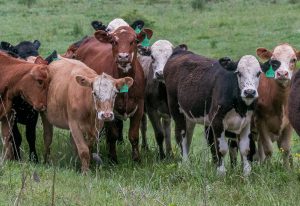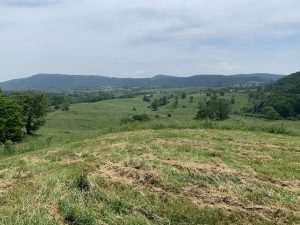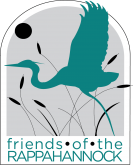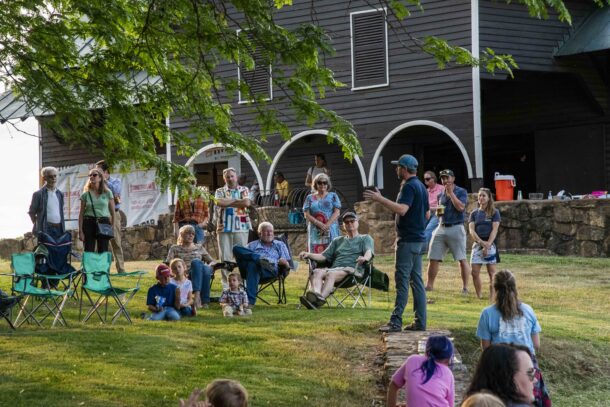If you own, lease, manage, or support a farming operation in the Rappahannock River watershed, there are lots of opportunities to improve the natural resources of your farm, forests, and waterways which lead to the Rappahannock River and Chesapeake Bay. There’s funding available through the Virginia Agricultural Cost-share (VACS) program if:

Cattle exclusion fencing reduces livestock access to streams. Streams that cattle regularly access are potential sources of N, P, and sediment pollution in the watershed.
- Your livestock are wading in a stream
- Your topsoil is eroding
- Your shoreline is receding
- You are unsure of how much fertilizer to apply
- You want to transfer low yield areas into forest
- Are looking to find other conservation opportunities in your region
Work with your Soil & Water Conservation District
The seven soil and water conservation districts that serve the Rappahannock River watershed have funds appropriated through the Virginia General Assembly to offer cost-share for a wide range of best management practices (BMPs) for your farm. The program that offers these funds is called the Virginia Agricultural Cost Share Program (VACS) and can provide technical assistance and substantial cost-share funding for qualifying projects. The excellent staff at your local Soil and Water Conservation Districts administer the VACS program throughout the 18 counties of the Rappahannock River Watershed. The practices within the program are designed to protect water quality, improve soil health, and improve the overall productivity on your farm and property.
How to qualify for funding
In order to qualify for the VACS program, a producer or landowner must meet certain eligibility requirements as outlined in the VACS program manual which is updated annually. Eligible agricultural land is defined as “land being used in a BONA FIDE program of agricultural management and engaged in the production of agricultural, horticultural or forest products for market.”

Eligibility requirements must be met in order to qualify for the VACS program.
The land under consideration must consist of a minimum of five contiguous acres and have verifiable gross receipts in excess of $1,000 per year from the production or sale of agricultural, horticultural or forest products produced on the applicant’s agricultural land for each of the past five years.
The best way to learn if your property or farm operation is eligible and would benefit from one or more of the bmps offered by the VACS program, is to reach out to the staff at your local soil and water conservation district. See the local program contacts listed by County below.
Additional funding for livestock fencing and tree planting
If you are interested in a livestock exclusion or reforestation project, Friends of the Rappahannock and the Rappahannock River Roundtable partners have resources to support the VACS program in conjunction with the applicable soil and water conservation district. This includes up to 100% cost-share for qualifying riparian buffer and other tree planting bmps.
For more information on the specific best management practices, specifications, and cost-share rates, you can view the current VACS manual here
CONTACT YOUR SOIL & WATER CONSERVATION DISTRICT
Culpeper SWCD
Serving Greene, Orange, Madison, Culpeper, and Rappahannock Counties: 540-825-8591
Open enrollment for VACS cost-share program
John Marshall SWCD
Serving Fauquier County: (540) 422 – 8490
Open enrollment for VACS cost-share program
Tri-County City SWCD
Serving Spotsylvania, Stafford, King George, and the City of Fredericksburg: 540-656-2402
Enrollment for Row Cover Crop deadline is Friday August 14, 2020
Open Enrollment for all other VACS practices
Hanover-Caroline SWCD
Serving Caroline and Hanover Counties: 804-537-3009
Enrollment for VACS program deadline is Friday August 14, 2020
Three Rivers SWCD
Serving Essex, King & Queen, and King William Counties
Enrollment for VACS program deadline is Friday August 14, 2020
Northern Neck SWCD
Serving Westmoreland, Richmond, Lancaster, and Northumberland Counties: 804 313-9102
Enrollment for VACS program ended on August 7, 2020
For additional information on programs available call NNSWCD
Tidewater SWCD
Serving Middlesex, Matthews, and Gloucester Counties: 804-699-3482
Enrollment for VACS program ended on August 7, 2020
For additional information on programs available call TSWCD

